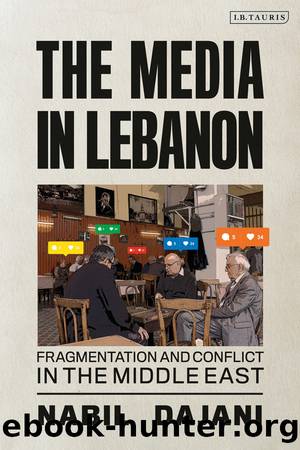Media in Lebanon by Nabil Dajani;

Author:Nabil Dajani;
Language: eng
Format: epub
Publisher: Bloomsbury UK
Conclusion
Broadcasting regulations in Lebanon were not intended to promote themes relevant to the livelihood of the average citizen. Themes that deal with integration between different sectarian and ethnic groups and their working together in national reconstruction and in bringing about unity of the people are almost absent in Lebanese television. Broadcasting legislations were not aimed at promoting original productions, or at providing more opportunities for local talent and developing responsible and professional organizational structures. Rather, state legislation was aimed at allowing government officials and the ruling political bosses to exploit the broadcasting media for their own goals.44 Television news programs focus mainly on news of politicians, with little reflective coverage of issues that concern the public.45
Lebanese television is owned or bonded to diverse tribal/sectarian/business authorities, thus it focuses on the concerns of these authorities with little or no interest in developing the public sphere that may address public issues of concern to Lebanese citizens. Televisionâs news advances the larger agenda of the tribal/sectarian/business authorities to whom the media are bonded. Television officials have a lesser amount of independent judgment. They are more vulnerable to influence by their sponsors and the sectarian/tribal groups to which they belong. Consequently, hate-promoters fill the Lebanese airwaves and journalistic public interest standards are doomed.
Lebanese television today is a mélange of various inconsistent programs, policies and structures, predominantly foreign in orientation and barely relevant to the needs of Lebanese society. The different commercial broadcasting channels have managed to marginalize the government-broadcasting channel, Tele Liban. This channel receives an inadequate financial budget and the plans of its officials to develop its service are regularly frustrated by political authorities in fear that this medium may develop into a serious competitor to the commercial channels that they own or control.
Examining the content of television programs, one gets the impression that television officials suppose that their viewers will adapt to whatever is given to them. This has led television channels to air low quality entertainment programs and talk shows that may entertain the common person but do not appeal to her/his mind or meet her/his intellectual and developmental needs. Thus, we find that in one television channel more than two-thirds of its cultural programs are presented in a foreign language. We also find, for example, that only one-third of the programs directed at children were in Arabic and that the majority of the remaining childrenâs programs were aired without Arabic subtitles.46
Lebanese television channels are mainly directed or supervised by the establishment; the establishment being the tribal/sectarian authorities who patronize the different national as well as foreign organizations, and not the government. Television organizations, therefore, often betray their viewers by failing to provide transparent information about issues that concern them, concentrating instead on augmenting and propagating the politicians that patronize them.
Television in Lebanon has succeeded more in social and political destruction than in building national unity and solidarity. It has contributed to the mobilization of the public to take negative action more than bringing about positive action. Television does not endeavor to work toward a unified Lebanon.
Download
This site does not store any files on its server. We only index and link to content provided by other sites. Please contact the content providers to delete copyright contents if any and email us, we'll remove relevant links or contents immediately.
| Anthropology | Archaeology |
| Philosophy | Politics & Government |
| Social Sciences | Sociology |
| Women's Studies |
The remains of the day by Kazuo Ishiguro(7551)
Tools of Titans by Timothy Ferriss(6947)
The Black Swan by Nassim Nicholas Taleb(6191)
Inner Engineering: A Yogi's Guide to Joy by Sadhguru(5897)
Giovanni's Room by James Baldwin(5878)
The Way of Zen by Alan W. Watts(5800)
The Six Wives Of Henry VIII (WOMEN IN HISTORY) by Fraser Antonia(4790)
The Power of Now: A Guide to Spiritual Enlightenment by Eckhart Tolle(4755)
Astrophysics for People in a Hurry by Neil DeGrasse Tyson(4620)
Asking the Right Questions: A Guide to Critical Thinking by M. Neil Browne & Stuart M. Keeley(4576)
12 Rules for Life by Jordan B. Peterson(3734)
The Ethical Slut by Janet W. Hardy(3503)
Skin in the Game by Nassim Nicholas Taleb(3460)
Housekeeping by Marilynne Robinson(3401)
The Art of Happiness by The Dalai Lama(3384)
Double Down (Diary of a Wimpy Kid Book 11) by Jeff Kinney(3272)
Skin in the Game: Hidden Asymmetries in Daily Life by Nassim Nicholas Taleb(3264)
Walking by Henry David Thoreau(3234)
12 Rules for Life: An Antidote to Chaos by Jordan B. Peterson(3201)
